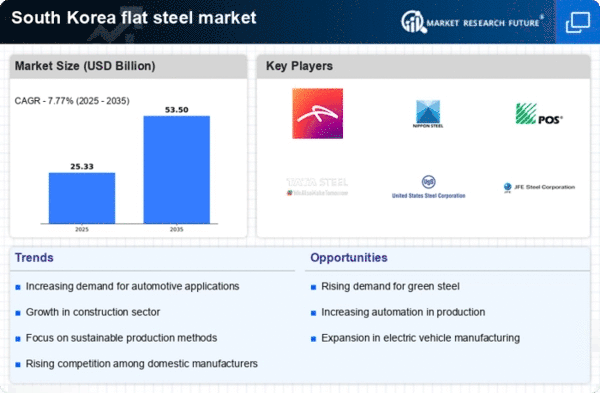The competitive landscape of the is characterized by several key players vying for market share through innovation, quality, and strategic distribution networks. With the robust industrial base of South Korea, the flat steel market plays a crucial role in various sectors, including automotive, construction, and manufacturing. The dynamics of competition are influenced by factors such as pricing strategies, technological advancements, and customer preferences. Companies are actively investing in research and development to enhance product offerings and develop high-performance materials that meet diverse industry requirements.
This competitive environment fosters a continuous cycle of improvement and adaptation among market participants to maintain their relevance and market position.Hyundai Hysco is a prominent player within the , recognized for its comprehensive product portfolio and commitment to quality. The company leverages advanced manufacturing techniques and technology to produce flat steel products that cater to different industries, notably automotive and construction. Hyundai Hysco's strengths lie in its ability to innovate and adapt to market needs, offering high-quality products that comply with international standards.
The company's established reputation, extensive distribution network, and significant investments in technology position it favorably in the competitive landscape, enabling it to address the specific demands of domestic customers effectively. With a focus on sustainability and efficient production processes, Hyundai Hysco continues to enhance its competitive edge within the market.Sangam Steel is another key player in the , offering a diverse range of flat steel products including hot rolled, cold rolled, and galvanized steel. The company’s strengths include a robust supply chain and strong partnerships with various industries such as automotive and construction, facilitating a substantial market presence.
Sangam Steel has made significant strides in enhancing its product quality and expanding its production capacity through strategic mergers and acquisitions, which have further solidified its position in the South Korean market. The company place a strong emphasis on customer satisfaction and service, ensuring that it meets the evolving needs of its clientele. By continuously investing in technological advancements, Sangam Steel aims to sustain its competitive advantages and achieve growth in the dynamic flat steel market.


















Leave a Comment